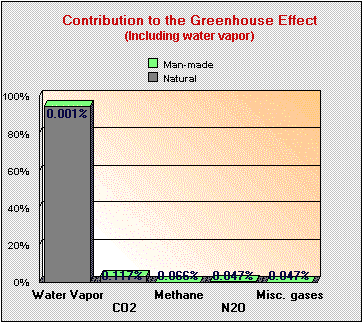saggyjones
Well-Known Member
While CO2 is technically a "greenhouse gas" it doesn't have nearly the effect that you contend it does.
May I direct back to this post:
https://www.houseofpolitics.com/forum/showpost.php?p=1859&postcount=35
"The most important players on the greenhouse stage are water vapor and clouds. Carbon dioxide has been increased to about 0.038% of the atmosphere (possibly from about 0.028% pre-Industrial Revolution) while water in its various forms ranges from 0% to 4% of the atmosphere and its properties vary by what form it is in and even at what altitude it is found in the atmosphere. In simple terms, however, the bulk of Earth's greenhouse effect is due to water vapor by virtue of its abundance. Water accounts for about 90% of the Earth's greenhouse effect -- perhaps 70% is due to water vapor and about 20% due to clouds (mostly water droplets), some estimates put water as high as 95% of Earth's total greenhouse effect. The remaining portion comes from carbon dioxide, nitrous oxide, methane, ozone and miscellaneous other "minor greenhouse gases." As an example of the relative importance of water it should be noted that changes in the relative humidity on the order of 1.3-4% are equivalent to the effect of doubling CO2.
The adjacent radiation absorption window graphic gives an idea of which molecules absorb various wavelengths. Where the shaded portions completely span between 2 lines it indicates that particular wavelength is fully absorbed and the "window" is saturated (or said to be "closed"). Rather obviously, once a window is saturated adding more gases with the same properties will do nothing. This point seems to cause confusion for some people so perhaps consider multiple shades on a window with each shade blocking half the light coming through - pull one shade and you reduce the light source by half, pull another so you block half the light coming through the first shade, etc.. The effect of each shade diminishes as you keep adding more and eventually you get no additional effect - you have saturated or blocked the radiation window and it makes no difference if you double or quadruple the number of shades again."
http://www.junkscience.com/Greenhouse/
Junk science? Please. This quote is from a real source:
Water vapor (H2O) causes about 60% of Earth's naturally-occurring greenhouse effect. Other gases influencing the effect include carbon dioxide (CO2) (about 26%), methane (CH4), nitrous oxide (N2O) and ozone (O3) (about 8%). Collectively, these gases are known as greenhouse gases. The greenhouse effect due to carbon dioxide is specifically known as the Callendar effect.
http://www.crystalinks.com/greenhouseffect.html
USMC the Almighty said:"Just how much of the "Greenhouse Effect" is caused by human activity?
It is about 0.28%, if water vapor is taken into account...Water vapor constitutes Earth's most significant greenhouse gas, accounting for about 95% of Earth's greenhouse effect...Water vapor constitutes Earth's most significant greenhouse gas, accounting for about 95% of Earth's greenhouse effect (4). Interestingly, many "facts and figures' regarding global warming completely ignore the powerful effects of water vapor in the greenhouse system, carelessly (perhaps, deliberately) overstating human impacts as much as 20-fold.
You don't understand that .28% is a large percentage when dealing with the climate. Even small changes can affect the atmosphere in many ways.
USMC the Almighty said:Water vapor is 99.999% of natural origin. Other atmospheric greenhouse gases, carbon dioxide (CO2), methane (CH4), nitrous oxide (N2O), and miscellaneous other gases (CFC's, etc.), are also mostly of natural origin (except for the latter, which is mostly anthropogenic).
Human activites contribute slightly to greenhouse gas concentrations through farming, manufacturing, power generation, and transportation. However, these emissions are so dwarfed in comparison to emissions from natural sources we can do nothing about, that even the most costly efforts to limit human emissions would have a very small-- perhaps undetectable-- effect on global climate."
-- Of the 186 billion tons of CO2 that enter earth's atmosphere each year from all sources, only 6 billion tons are from human activity. Approximately 90 billion tons come from biologic activity in earth's oceans and another 90 billion tons from such sources as volcanoes and decaying land plants.
-- At 368 parts per million CO2 is a minor constituent of earth's atmosphere-- less than 4/100ths of 1% of all gases present. Compared to former geologic times, earth's current atmosphere is CO2- impoverished.
Like I said, even seemingly small changes can have a big impact.
USMC the Almighty said:-- CO2 is odorless, colorless, and tasteless. Plants absorb CO2 and emit oxygen as a waste product. Humans and animals breathe oxygen and emit CO2 as a waste product. Carbon dioxide is a nutrient, not a pollutant, and all life-- plants and animals alike-- benefit from more of it. All life on earth is carbon-based and CO2 is an essential ingredient. When plant-growers want to stimulate plant growth, they introduce more carbon dioxide.
You can over-water plants you know, and you can suffocate them with too much CO2.
USMC the Almighty said:-- CO2 that goes into the atmosphere does not stay there but is continually recycled by terrestrial plant life and earth's oceans-- the great retirement home for most terrestrial carbon dioxide.
We are deforesting so much that plants won't be able to handle the CO2 in the same way.



